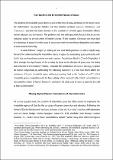Files in this item
Karl Barth on the irresistible nature of grace
Item metadata
| dc.contributor.author | Torrance, Andrew Bartholomew | |
| dc.date.accessioned | 2018-05-01T23:32:53Z | |
| dc.date.available | 2018-05-01T23:32:53Z | |
| dc.date.issued | 2016-05 | |
| dc.identifier | 243086306 | |
| dc.identifier | a24c0b56-60e7-42d5-8c33-5692c63b9f6c | |
| dc.identifier | 84978140737 | |
| dc.identifier | 000383667300002 | |
| dc.identifier.citation | Torrance , A B 2016 , ' Karl Barth on the irresistible nature of grace ' , Journal of Reformed Theology , vol. 10 , no. 2 , 1 , pp. 103-128 . https://doi.org/10.1163/15697312-01002013 | en |
| dc.identifier.issn | 1569-7312 | |
| dc.identifier.other | ORCID: /0000-0001-5604-8247/work/61133134 | |
| dc.identifier.uri | https://hdl.handle.net/10023/13272 | |
| dc.description.abstract | Few issues have been as divisive for the contemporary church as the doctrine of irresistible grace. In the debates surrounding this doctrine, there has been an overwhelming tendency for theologies of grace to focus on the effects that grace has on particular human beings. Alongside this tendency, there has arisen a danger that we forget that God’s grace is God’s grace; that it is God’s free, personal, and beneficent disposition and action. In this article, I turn to Karl Barth to consider a way forward for interpreting the irresistible nature of grace that does not focus on its effectuality but on its theocentric, participative, and covenantal character. | |
| dc.format.extent | 26 | |
| dc.format.extent | 314726 | |
| dc.language.iso | eng | |
| dc.relation.ispartof | Journal of Reformed Theology | en |
| dc.subject | Karl Barth | en |
| dc.subject | Irresistible Grace | en |
| dc.subject | Systematic theology | en |
| dc.subject | Church Dogmatics | en |
| dc.subject | Human freedom | en |
| dc.subject | BR Christianity | en |
| dc.subject.lcc | BR | en |
| dc.title | Karl Barth on the irresistible nature of grace | en |
| dc.type | Journal article | en |
| dc.contributor.institution | University of St Andrews. School of Divinity | en |
| dc.identifier.doi | 10.1163/15697312-01002013 | |
| dc.description.status | Peer reviewed | en |
| dc.date.embargoedUntil | 2018-05-01 |
This item appears in the following Collection(s)
Items in the St Andrews Research Repository are protected by copyright, with all rights reserved, unless otherwise indicated.

